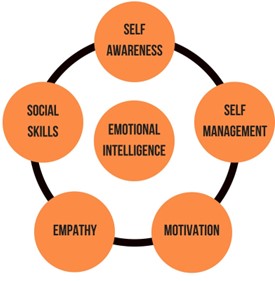Author: Celia Denton
Editor’s comment: Over the next few months, we will been running a series of articles on emotional intelligence (EQ) by PTES Consulting’s Celia Denton, our go-to expert for professional psychometric testing services.
Why is it important to build emotional intelligence?
Today’s reality is that the skills that used to spell success are now no longer enough. As technology evolves, we are beginning to realise that it is our humanness, and not what we know, that is actually our competitive advantage.
Speak to any thriving organisation and they will agree – the role of ‘soft skills’ plays an important role in their success. Soft skills are the building blocks of emotional intelligence, and while some may refer to it as the ‘fluffy stuff’, in reality it is the essence of our humanity. It differentiates us from artificial intelligence and other modern technologies. For centuries we have been educated and moved into the workforce by robotically completing task after task. Now however, it is our empathy, awareness, creativity and social intelligence that is critical for our success in the world of work.
EQ has to do with the essence of how you communicate, your ability to adapt, and your capacity for working with those in your team, clients, and anyone you meet. And this is a very good thing! Employees are now being recognized for their humanity and individuality, and being valued for their thoughts and feelings. Their opinions and influences count, because each person’s authentic self is key to the growth of a healthy business.
Benefits of emotional intelligence in the workplace
- Stronger leadership skills (active listening, empathy, and being emotionally aware of your own state of equilibrium)
- Improved negotiation skills and team performance
- Development of greater self-awareness
- Increased levels of inner resilience and personal wellbeing
- Reduced stress
- Greater work-life balance and job satisfaction
How to develop EQ
So how do we actually ‘walk the talk’ and go about creating emotional intelligence or an emotional quotient in our lives? Here are some pointers to keep in mind.
Take the time to listen
When you are able to listen to a colleague or client’s point of view, it builds better communication. What’s more, you learn to relate to one another. This empathy in turn leads to harmony and trust, which is key to building better work relationships.
Put personal boundaries in place
While it is good to be amiable and relate positively to people in the workplace, it is also imperative to create boundaries. For your own benefit, find ways to filter negative emotions and toxic influences. Without clear boundaries, it will be hard to maintain your equilibrium.
Take the time to build your own happiness
When you are not working, make sure to find ways to feed your soul. Invest time in doing the things that make YOU happy.
Practice gratitude
The ability to build a genuine source of joy comes directly from having a sense of gratitude. Make it a daily practice to write down things that you are grateful for. Over time, you will see how this positively influences your entire state of mind and being.
Enrol in an emotional intelligence course
If you feel you could use some extra guidance on how to build your own (or others) EQ, then enrol in a course. The benefits will be life-changing! Inquire about our emotional intelligence test and workshop here.


